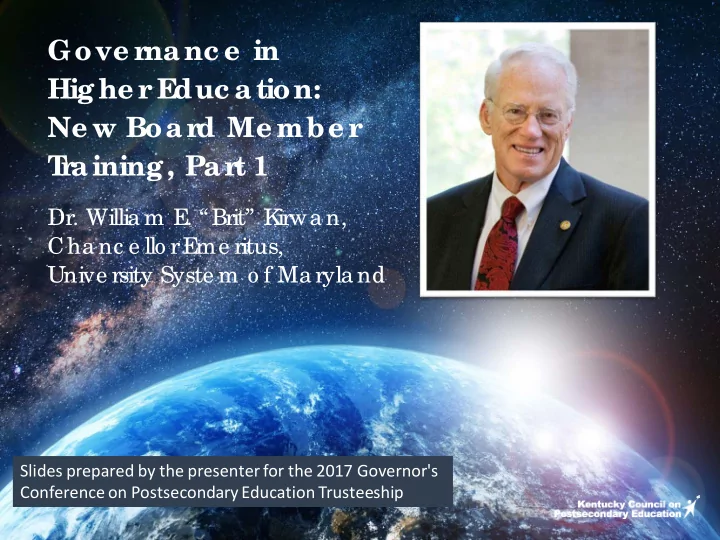

Gove r nanc e in Highe r E duc ation: Ne w Boar d Me mbe r T r aining, Par t 1 Dr. Willia m E . “Brit” Kirwa n, Cha nc e llo r E me ritus, Unive rsity Syste m o f Ma ryla nd Slides prepared by the presenter for the 2017 Governor's Conference on Postsecondary Education Trusteeship
Brit Kirwan AGB Senior Consultant September 11, 2017 Consequential Boards and 21 st Century Governance Prepared for the Conference on Postsecondary Education Trusteeship
THE PRESIDENT AND THE INSTITUTION ARE ONLY AS GOOD AS THE BOARD 3
Challenging Times for Higher Ed At risk are… • Accessibility, affordability, and degree attainment • Institutional fiscal sustainability • Educational quality • Economic development and social equity • Service to communities • Knowledge creation 4 •
Realities to Recognize • New student populations • New educational delivery methods • Basic changes in financing • Rising expectations from the public • Changing mission • Greater accountability 5
Kentucky Postsecondary Trusteeship Eight Characteristics of Highly Performing Boards 6
High Performing Boards 1. Understand the difference between governance and management • Set - and ensure presidents faithfully implement - institutional policies • Thoroughly review and approve institutional mission, major goals and plans; and hold president accountable for progress toward their achievement • Raise issues of interest ; get responses through the president • Recognize that the president is both CEO and the board’s chief administrative officer 7
High Performing Boards 2. Boards focus on long-term fiscal stability and academic quality • Constantly monitor and prepare for changing fiscal circumstances • Ensure meaningful degrees at affordable costs • Periodically review existing degree programs for quality and relevance to institutional mission • Ensure development of new programs to meet workforce needs 8
High Performing Boards 3. Improve governance through: • Adhering to established processes • Attention to board/president relationship - Requires direct and constructive dialogue - Annual and systematic performance review • Commitment to shared governance 4. Improve capacity and functionality through: • Attention to qualifications and recruitment of members • Orientation and continuing education • Committee composition 9
High Performing Boards 5. Make meetings meaningful • Ensure time spent on items reflects their importance • Develop consent agendas for routine matters • Use performance dashboards to expedite transparency and accountability • Encourage full and inclusive discussion • Promote spirited inquiry and respect constructive dissent • Include forums on emerging issues 10
High Performing Boards 6. Add value to the institution by gaining and ensuring public trust and by adherence to fiduciary responsibilities • Advocates for the value of the institution and its mission • Highly creditable source of institution integrity (MORE ON FIDUCIARY DUTIES IN A MOMENT) 11
High Performing Boards 7. Set goals annually aimed at improving performance and impact • Monitor progress • Celebrate successes 8. Conduct periodic evaluations of performance 12
Boards at Their Best Maintain fidelity to institutions’ missions • Focus on the main things vs “majoring in minors” • Think independently; govern collectively • Accept joint ownership of problems and decisions • Operate transparently and champion accountability • Model behaviors and values trustees want • institution to emulate 13
Boards at Their Best continued… Are a source of strategic and comparative advantage • Prepare diligently and participate collegially • Abstain from individual initiatives and directives • Pose the right questions ; don’t impose the wrong • solutions 14
Boards at Their Best Think and work in 3 modes: 1. Oversight 2. Foresight 3. Insight 15
Three Modes Oversight – Set and refine missions – Generate and allocate resources – Ensure integrity and compliance – Monitor performance Foresight – Insist on and review SWOT analyses – Probe and approve plans and strategies – Ensure resource allocations are aligned with priorities 16
Three Modes Insight - Raise problems and issues - Identify opportunities - Ensure different perspectives are heard Richard Chait, Harvard University 17
Boards as Fiduciaries 18
Who is a Fiduciary? A person who holds a legal and ethical obligation of trust in overseeing the assets of another person or entity . 19
Trustees as Fiduciaries The Assets The college governed, including its mission and • identity, physical property, human resources, educational product, endowment, and reputation. For Whom The institution, its students and their families • (current and future), faculty, donors, alumni. The state and country and citizens • 20
Three Fiduciary Duties 1. Duty of Care 2. Duty of Loyalty 3. Duty of Obedience 21
Fiduciary Duties Duty of Care • Act in good faith and in the best interests of the institution • Act with the degree of diligence and skill ordinarily prudent persons would exercise in like positions Obligations • Ensuring institution’s short and long-term fiscal well-being • Protecting its academic reputation • Faithfully attending board meetings and making informed decisions • Holding in strict confidence all personnel and other sensitive matters brought before the board 22
Fiduciary Duties Duty of Loyalty • Always act in what is deemed to be the best interest of the institution • Never act out of personal interests • Avoid undo external external influence on board actions Obligations • Establishing and periodically reviewing policies on conflict of interest • Establishing processes for recusal when board members have conflicts of interest 23
Fiduciary Duties Duty of Obedience • Ensure the institution acts consistently with its mission • Ensure the institution acts in accordance with federal and state laws and board policies Obligations • Conduct periodic review of institutional mission and make adjustments to it when necessary • Create and maintain policies and practices that ensure ongoing compliance with federal, state and county laws and reporting requirements 24
THE PRESIDENT AND THE INSTITUTION ARE ONLY AS GOOD AS THE BOARD 25
Additional questions? Thank You Dr. William “Brit” Kirwan bkirwan@usmd.edu 26
Recommend
More recommend